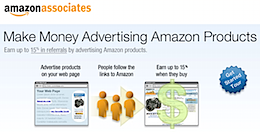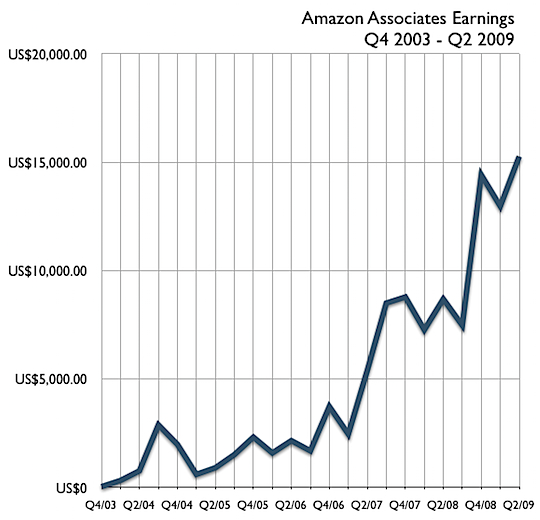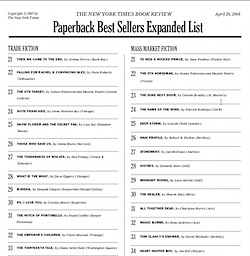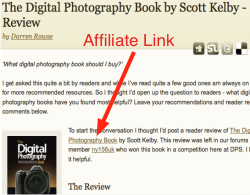11 Lessons I Learned Earning $119,725.45 from Amazon Associates Program
I have earned $119,725.45 from Amazon Associates Program since I began using it as a way to make money online late in 2003. Around half of that amount was made within the last 12 months.
In this post I want to share what I’ve learned along the way on how to make money with Amazon.

While Amazon’s Associates program is not my largest income stream (I rank how I make money blogging here) it was actually the
first
experiment that I did with monetizing blogs. I began to experiment with
it in the last quarter of 2003 (just before I started using AdSense).
I started using it on a personal blog that had been going for around
12 months and had around a thousand readers a day – the first quarter
was not spectacular in terms of earnings –
I made $31.80 (around 30 cents a day) and almost gave it away.
I’m glad I stuck with it – here’s a chart of the quarterly earnings
since the last quarter of 2003 (note, it doesn’t include July or August
of this year as that’s an incomplete quarter so the overall figures from
this period is below the $119k figure mentioned above):

As you can see there has been some ups and downs since the early days
but the overall trajectory has been positive. It’s a little hard to see
in the chart, as it is quarterly, but Decembers are always great months
– last December is still the best month I’ve ever had despite last
quarter being a record over a 3 month period.
So what have I learned on the way to earning six figures from Amazon?
Today I want to share 11 tips on what I’ve learned in making money
blogging from the Amazon Associates Program. Tomorrow I’ll share another
10 (update: You can read Part 2 here).
1. Traffic Traffic Traffic

Let’s
start with the most obvious point – one of the biggest factors in the
upward swing in my Amazon earnings has been a corresponding upward swing
traffic.
As with most ways of making money from blogging
the more eyeballs that see your affiliate promotions – the better
chance you have of it converting (of course this is a generalization as
not all kinds of traffic converts – but more of that in the next point).
While I do think it’s worth starting to experiment with affiliate
promotions early on in your blog (even before you have a heap of
traffic) your main focus in the early days needs to be upon creating
great content and building traffic to your blog.
2. Loyalty and Trust Convert

One
of the other major factors that has come into play with the increase in
earnings that I’ve had has been the type of readership I’ve managed to
gather on my blogs. While I do get a fair bit of search engine traffic
I’ve found that in most cases (and there is an exception below) search
visitors are not converting with affiliate programs on my blogs –
instead it is loyal and repeat readers.
The main reason for this is that those readers who connect with you
on a daily basis over the long haul develop a trust with you (and your
blog) and so when you make a recommendation or do a review they’re more
likely to take that advice.
3. The Intent of Readers Matters

Another
big factor in the equation of Amazon conversions is the intent that
your readers have when they visit your blog. Why are they there and at
what stage in the ‘buying cycle’ are they at?
I began to think about this just over a year ago as I looked at the
growing traffic on my photography site but realized that my Amazon
earnings didn’t seem to be keeping up with the traffic growth that I was
experiencing. What I realized is that DPS was a blog that was largely
writing about ‘tips on how to use a camera’ and that as a result it
wasn’t really drawing readers to it who were in a ‘buying mood’. In fact
a survey that I did found that many of my readers had recently
purchased a camera and were on my site specifically because they wanted
to learn how to use it.
As a result I added to the mix of new content on the site more
articles relevant to people buying a digital camera. I wrote tips with
advice on buying cameras, reviews of digital cameras and equipment etc.
This culminated in a while new section on the blog devoted to ‘gear’.
Slowly this has attracted new readers to the blog – readers who are
researching their next camera purchase – readers who are more likely to
click a link to Amazon and who once there are more likely to make a
purchase.
This is where search traffic can convert with affiliate programs – ie
when you’re writing content that people in a ‘buying mood’ are
searching for.
4. Relevancy Matters

This
is another common sense tip that many of us (yes I failed on this one
in my early days) mess up. The more relevant to your audience the
products are that you promote the better chance you’ll have of
converting.
- Promote iPods on your blog that largely talks about spirituality and
you are unlikely to convert (believe me, I tried) – promote relevant
books, CDs and DVDs instead.
- Promote perfume on your travel blog and you’re unlikely to see many
sales – travel books, luggage and other travel products will work
better.
Sometimes it is hard to find a product that matches your topic
(Amazon doesn’t work with every topic) but try different products
related to your topic and track what converts best for your audience.
 5. Get People in the Door and Let Amazon Do What they’re Good At
5. Get People in the Door and Let Amazon Do What they’re Good At
One of the great things about Amazon is that it is a site people are
familiar with, that they trust and that is very good at converting
people to be buyers. They have honed their site to present people with
relevant products to them (based upon previous surfing and buying
habits) and over many years have tweaked their site to convert well.
As a result I find that once you get people to visit Amazon (pretty
much for any reason) that a percentage of them will naturally end up
buying something. The cool thing is that whether they buy the thing you
linked to or not – you’ll earn a commission.
While I find specific promotions of particular products work best
with Amazon – I also have had some success by getting people in the door
for other reasons. For example I recently
ran a post on DPS that gave readers a hypothetical $1000 to spend on
photography gear and asked them to surf around Amazon and choose what
they wanted to buy. The result was 350 comments and quite a few sales.
While a ‘get people in the door’ strategy might seem to grate a
little with my ‘Relevancy’ tip in point #4 – the key is to get people in
the door in a relevant way. Once they’re there the purchases they make
might not be ‘relevant’ to your blog but their motivation to visit
should be.
 6. Social Proof Marketing 1 – Best Seller Lists
6. Social Proof Marketing 1 – Best Seller Lists
People are more willing to make a purchase if they feel that they’re
not alone and if they know that others have and are buying with them.
I’m sure there’s some insightful psychological reasons for this but from
where I sit buying seems to somehow have become a communal activity.
One of the most powerful social proof marketing strategies that I’ve
used with promoting Amazon affiliate links is creating ‘Best Seller’
type lists for readers to show them what is currently popular in terms
of purchases in our community.
The best example that I can give of this technique in action is my Popular Digital Cameras and Gear
page on DPS. It’s a page that I update every three months, that I link
to prominently on the blog and that converts really well. To construct
it I simply go through the reports/stats that Amazon gives affiliates to
look at what products are selling the best from within my community. I
then pull it into different categories of products and ‘Waahlaaa’ – we
have a best seller list.
It converts well because readers know that others in their community
are buying these products too – there’s a Wisdom of the Crowd mentality
going on I guess. Another quick example of this was a recent post – 23 Photography Book Reviews [Ranked]
where I ranked the top selling photography books in order of sales but
also linked to reviews we’d done of each of them on the blog.
Note: the key with these ‘best seller’ lists is to drive traffic to
them. One way to do this is to link prominently to these pages from
within your blog and to link to them from within other posts from time
to time on your blog so that the post doesn’t just convert for a day or
two while your post is the most recent one on your blog.
7. Social Proof Marketing 2 – Reader Reviews

I
used to do all of the reviews of photography books on DPS. It was
mainly because I couldn’t find anyone else to do them and probably
partly a little because I’m a control freak.
However one day I had a reader offer to write a book review for me.
Because I knew the reader I thought it’d be OK so published it. As with
all my reviews it had an affiliate link to Amazon in it. I was a little
skeptical about whether it’d convert though because I thought my readers
might not respond as well to a stranger’s review of the book as opposed
to my own. I was wrong.
The review not only converted as well as my normal reviews – but did
even better than normal! This could have been for many reasons but one
that I suspect came into play was the way that I introduced the reviewer
as a ‘DPS reader’. I didn’t build them up to be an expert, I just
presented them as a normal reader with no agenda wanting to share some
thoughts on a book that had helped them.
I suspect that the social proof concept came into play a little here.
Readers saw another reader recommending something in a genuine way and
wanted to get a copy for themselves.
Note: interestingly Amazon themselves uses reader reviews as a fairly major feature of their site.
8. Genuine Recommendations and Reviews

There
are two main ways that I promote Amazon links. The first is in
‘Reviews’ for products (the second I’ll cover below in the next point).
These links are where I or one of my writers will genuinely look over
and test a product and give it the once over.
I insist my writers actually read the books, test the cameras and use
the software products that they review and encourage them to be as
genuine and unbiased as possible so as to point out both the pros and
cons of the product. While there’s some temptation to hype up a product
and only talk about it’s positives a real review will help your reader
relationship over the long haul and I find actually helps promote sales.
Review links work well because it’s usually people who are
considering buying a product who really read reviews – it comes down to
the buying mood/intent mentioned in point #3.
9. Informational Links

The
other type of link that I use to Amazon is when I’m mentioning a
product in passing and/or a new product is announced that is relevant
for my niche. For example when the Nikon D300s
was announced recently by Nikon we immediately posted about the news
because it was a notable and anticipated camera announcement. The camera
was not yet available in stores and we were not able to get a review
sample yet – but it was available for Pre-Order on Amazon so we linked
to it.
There was no recommendation or review attached to the link but it was
a relevant link for readers who wanted to know more about it (price,
specs, pictures etc). Some readers pre-ordered the cameras from that
link.
Similarly if we’re writing about Photoshop or another photography
post production software we’ll usually include a link to the software.
Again it’s not a review link but rather an informational/contextual type
link. These don’t tend to convert as well in terms of sales but they do
get people ‘in the door’ at Amazon and can help a little with sales
from time to time.
10. Contextual is King

One
of the biggest reasons my initial attempts with Amazon fell flat on
their face and simply didn’t convert was that I thought it’d be enough
to slap an image based button on my sidebar that featured a product or
that was simply a banner ad to Amazon.
Amazon give publishers a lot of these type banners but despite trying
almost all of them I’ve had little or no success with using them at
all. Instead – 99% of my conversions have come from links to Amazon from
within blog posts when I’m writing about the products themselves.
By all means experiment with the widgets and buttons Amazon gives you
– if they do convert for you then more power to you – but every blogger
I’ve talked to that has had success with Amazon tells me that it is
contextual links from within blog posts that work best.
11. Promote Specials, Promotions and Discounts

There’s
hardly a product on Amazon that does not have a listed discount on it.
Most books are as much as 30% off recommended retail prices and at
different times during the year Amazon runs other special discounts and
promotions on different single products or in different product
categories.
Keep an eye out for these kinds of promotions because they can be
well worthwhile promoting (if relevant to your readership). In fact last
time Amazon had cameras on special I promoted it to my newsletter
readers and had readers emailing me to thank me for letting them know
about it.
Another related tip is that when you’re writing a review of a product
and Amazon have a listed discount – include a note about the discount
in the post (see yesterdays post about Chris Brogan’s new book for an example).
11 More Amazon Associates Tips Tomorrow
I’ve got another set of tips to share with you on how to make money with the Amazon Associates program tomorrow (update: You can read it here. I’ve also added a 3rd post to the series with 10 more tips for making money with Amazon Associates).
I’d love to hear how you’ve gone with promoting this program? Have you had any success? What tips would you give?
 While Amazon’s Associates program is not my largest income stream (I rank how I make money blogging here) it was actually the first
experiment that I did with monetizing blogs. I began to experiment with
it in the last quarter of 2003 (just before I started using AdSense).
While Amazon’s Associates program is not my largest income stream (I rank how I make money blogging here) it was actually the first
experiment that I did with monetizing blogs. I began to experiment with
it in the last quarter of 2003 (just before I started using AdSense). 
 Let’s
start with the most obvious point – one of the biggest factors in the
upward swing in my Amazon earnings has been a corresponding upward swing
traffic.
Let’s
start with the most obvious point – one of the biggest factors in the
upward swing in my Amazon earnings has been a corresponding upward swing
traffic.  One
of the other major factors that has come into play with the increase in
earnings that I’ve had has been the type of readership I’ve managed to
gather on my blogs. While I do get a fair bit of search engine traffic
I’ve found that in most cases (and there is an exception below) search
visitors are not converting with affiliate programs on my blogs –
instead it is loyal and repeat readers.
One
of the other major factors that has come into play with the increase in
earnings that I’ve had has been the type of readership I’ve managed to
gather on my blogs. While I do get a fair bit of search engine traffic
I’ve found that in most cases (and there is an exception below) search
visitors are not converting with affiliate programs on my blogs –
instead it is loyal and repeat readers. Another
big factor in the equation of Amazon conversions is the intent that
your readers have when they visit your blog. Why are they there and at
what stage in the ‘buying cycle’ are they at?
Another
big factor in the equation of Amazon conversions is the intent that
your readers have when they visit your blog. Why are they there and at
what stage in the ‘buying cycle’ are they at? This
is another common sense tip that many of us (yes I failed on this one
in my early days) mess up. The more relevant to your audience the
products are that you promote the better chance you’ll have of
converting.
This
is another common sense tip that many of us (yes I failed on this one
in my early days) mess up. The more relevant to your audience the
products are that you promote the better chance you’ll have of
converting. 5. Get People in the Door and Let Amazon Do What they’re Good At
5. Get People in the Door and Let Amazon Do What they’re Good At 6. Social Proof Marketing 1 – Best Seller Lists
6. Social Proof Marketing 1 – Best Seller Lists I
used to do all of the reviews of photography books on DPS. It was
mainly because I couldn’t find anyone else to do them and probably
partly a little because I’m a control freak.
I
used to do all of the reviews of photography books on DPS. It was
mainly because I couldn’t find anyone else to do them and probably
partly a little because I’m a control freak.  There
are two main ways that I promote Amazon links. The first is in
‘Reviews’ for products (the second I’ll cover below in the next point).
These links are where I or one of my writers will genuinely look over
and test a product and give it the once over.
There
are two main ways that I promote Amazon links. The first is in
‘Reviews’ for products (the second I’ll cover below in the next point).
These links are where I or one of my writers will genuinely look over
and test a product and give it the once over.  The
other type of link that I use to Amazon is when I’m mentioning a
product in passing and/or a new product is announced that is relevant
for my niche. For example when the Nikon D300s
was announced recently by Nikon we immediately posted about the news
because it was a notable and anticipated camera announcement. The camera
was not yet available in stores and we were not able to get a review
sample yet – but it was available for Pre-Order on Amazon so we linked
to it.
The
other type of link that I use to Amazon is when I’m mentioning a
product in passing and/or a new product is announced that is relevant
for my niche. For example when the Nikon D300s
was announced recently by Nikon we immediately posted about the news
because it was a notable and anticipated camera announcement. The camera
was not yet available in stores and we were not able to get a review
sample yet – but it was available for Pre-Order on Amazon so we linked
to it. One
of the biggest reasons my initial attempts with Amazon fell flat on
their face and simply didn’t convert was that I thought it’d be enough
to slap an image based button on my sidebar that featured a product or
that was simply a banner ad to Amazon.
One
of the biggest reasons my initial attempts with Amazon fell flat on
their face and simply didn’t convert was that I thought it’d be enough
to slap an image based button on my sidebar that featured a product or
that was simply a banner ad to Amazon.  There’s
hardly a product on Amazon that does not have a listed discount on it.
Most books are as much as 30% off recommended retail prices and at
different times during the year Amazon runs other special discounts and
promotions on different single products or in different product
categories.
There’s
hardly a product on Amazon that does not have a listed discount on it.
Most books are as much as 30% off recommended retail prices and at
different times during the year Amazon runs other special discounts and
promotions on different single products or in different product
categories.